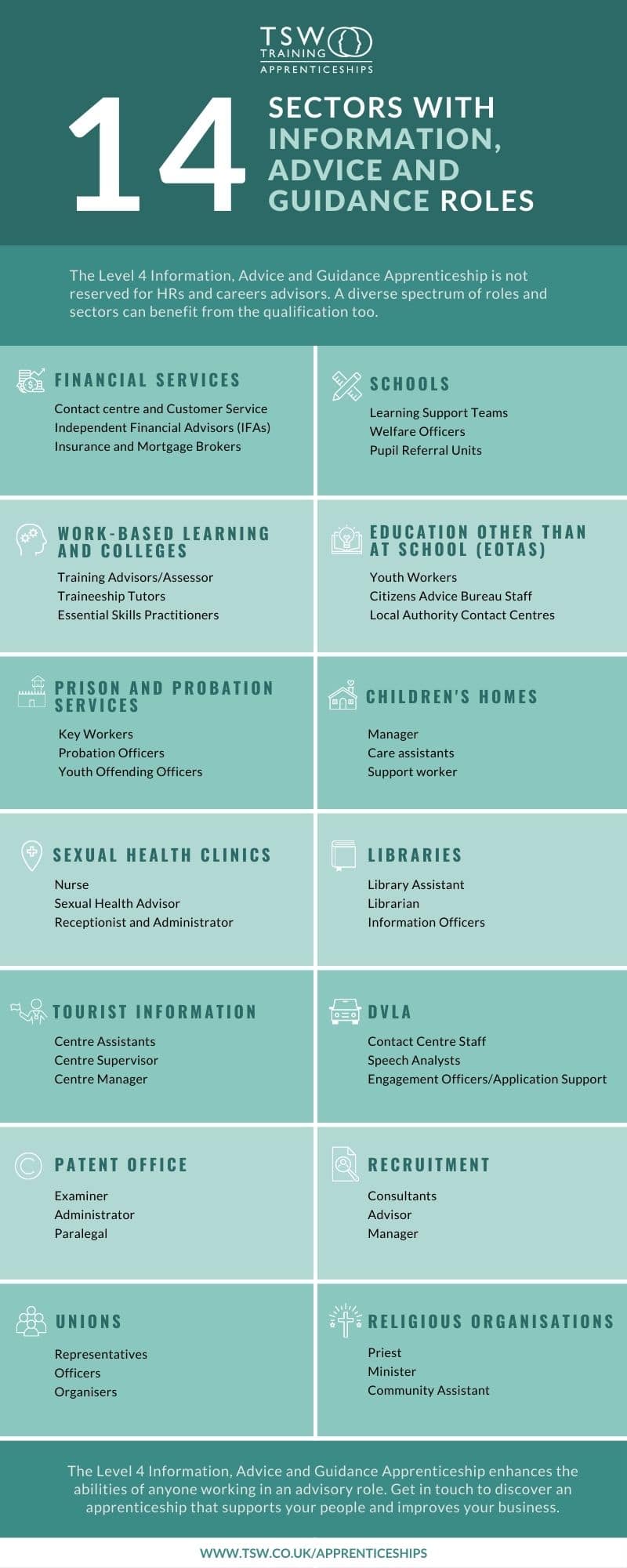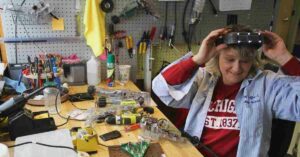Our Level 4 Information, Advice, and Guidance qualification isn’t reserved for HRs and career advisors.
There’s a diverse spectrum of roles that can benefit from the programme too, some of which you might not expect! Strong communication skills are valued across many sectors, from finance, to patent offices, and religious organisations too.
Did your job make the list?
Financial Services
1. Contact Centre Advisor
The first port of call for plenty of frustrated customers, a contact centre advisor is constantly resolving problems, and relaying information.
With a Level 4 IAG qualification in their arsenal, people in this job role can practice empathy and confidence when it comes to chatting with clients.
2. Independent Financial Advisors (IFA’s)
A lot of people rely on independent financial advisors to give unbiased guidance on how to spend their money wisely.
It’s a job that comes with a huge level of trust and responsibility so having an IAG qualification to back you up could be a big help.
3. Insurance and Mortgage Brokers
Helping their clients to navigate the complicated worlds of insurance and mortgages, brokers are constantly advising people on the best course of action.
Although the main focus is the more practical matter of finance, there’s a lot of emotion tied up in buying a house or taking out life insurance, for example. Honing softer skills, such as empathy, could help brokers to balance the more emotional side of their job with the factual.
Education
4. Learning Support Teams
Supporting pupils who have difficulty learning, a learning support team helps the student and their parents to engage with classes and make their school experience easier.
Relaying information and passing on advice is a key part of a learning support team’s job so having an IAG qualification can make a huge difference to their skills and confidence.
5. Welfare Officers
Responsible for safeguarding young people, a welfare officer makes sure that everyone is treated fairly within their care.
Giving an objective opinion on a child’s situation, welfare officers could use an IAG qualification to handle sensitive situations.
6. Pupil Referral Units
Staff working at a pupil referral unit are often working with children who can’t go to school, for a number of reasons. It could be an illness that prevents them from attending, or they may have been excluded from a mainstream school.
Offering guidance to students and their parents is a daily occurrence at a pupil referral unit.
Work-based Learning and Colleges
7. Training Advisor/Assessor
At TSW Training, our training advisors do more than train their learners. They listen to any personal problems, address concerns, and are always at the end of the phone if their learner needs them.
Lots of our staff have taken IAG courses to boost their ability to help their students and provide advice that can alleviate any worries.
8. Traineeship Tutors
A traineeship tutor provides support and guidance to pupils on a learning programme.
As well as training students in a specific skill, a traineeship tutor can be a key part of a learner’s education. Some learners even think having a supportive traineeship tutor helped them complete the course they were taking.
9. Essential Skills Practitioners
Along with Training Advisors, Essential Skills Practitioners are there to support learners with key skills such as English, Maths, and Welsh.
More often than not, learners won’t have completed an English or Maths qualification since school, so Essential Skills Practitioners must provide guidance to people who might be nervous about picking these subjects back up again.
An IAG qualification can really boost their confidence when it comes to helping learners find their feet.

Education Other Than School (EOTA’s)
10. Youth Workers
Within a community, a youth worker can help young people to build relationships with their peers and find opportunities to learn.
As they encourage the people in their care to develop life skills, a youth worker can have a big influence on a young person’s core years, so being able to communicate well is critical.
An IAG qualification could provide a youth worker with the skills to do just that.
11. Citizens Advice Bureau Staff
People across the UK flock to the Citizens Advice staff to help them find independent guidance on money problems, housing issues, and more.
Imparting advice confidentially, the staff must be empathetic to people’s problems, as well as efficient enough to meet the demands of millions of people who contact them every year.
Studying for an IAG qualification could help them improve both of these skills.
12. Local Authority Contact Centres
Handling queries from the local community, staff working in a local authority contact centre will be resolving customer problems every day.
It’s important that adequate support is given, so residents feel valued and local governments meet their targets.
In this instance, a Level 4 IAG qualification would be a great way to build the team’s confidence in dealing with complaints or concerns from the general public.
Prison and Probation Services
13. Key Workers
While in prison, people are assigned a key worker to be a support in many ways. This could include helping them to engage with prison officers, motivating them to complete tasks, and helping them with their mental health.
Intended to bring the rate of self-induced harm down among prisoners, a key worker’s role could include listening to stories of traumatic events and helping people go on to live fulfilled lives.
Training in the IAG discipline can help them to feel that they can deliver all of this and more to the people in their care.
14. Probation Officers
In a similar way, probation officers help offenders before their sentencing, throughout their trial, and help them to rebuild their lives once they’ve completed their time in prison.
Communicating with victims, police officers, and other people within prison services, probation officers need to be able to talk to a range of people on a daily basis.
Their support and guidance has the potential to change lives, so it’s important they know how to give advice effectively.
15. Youth Offending Officers
Specifically working with young people, a youth offending officer will be responsible for supporting offenders so they won’t re-offend.
It’s helpful for youth offending officers to have an IAG qualification; they’ll be working with lots of different agencies such as housing associations, and potentially drug and alcohol services, so they must be able to support and advise the young people in their care in the right way.
That gives them the best possible chance of living a crime-free life once their sentencing is over.
Children’s Homes
16. Children’s Home Manager
Managing a team in a children’s home, a manager supports the staff who work there, as well as making sure the welfare of the children is taken care of.
A children’s home manager could benefit from an IAG because the knowledge they gain could help them when staff ask for advice and guidance on specific topics.
17. Care Assistants
Ensuring children’s needs are met, a care assistant works within a children’s home to help give basic personal and social care.
Working closely with the children, care assistants will need to develop a rapport and trust with the young people in the home.
If a child needs emotional support, a care assistant can also help deliver that. An IAG qualification would come in handy here.
18. Support Worker
Similar to a care assistant, a support worker can provide guidance to children who need it, and develop a bond with the people in their care.
A support worker can also advise young people on things like budgeting or getting a job. Completing an IAG certification could support this aspect of the job in particular, helping support workers to find the most effective way to signpost young people to the relevant organisations.
Sexual Health Clinics
19. Nurse
Confidentiality is key for a sexual health nurse who must advise and support clients who come into the clinic.
Making a diagnosis and explaining this to the people they’re treating isn’t always easy but knowing how to deliver information is vital.
20. Sexual Health Advisor
Once a nurse has made a diagnosis, a sexual health advisor will provide counselling to clients, should they need it.
Their strong knowledge of all types of STIs, coupled with their experience in health education, can help them give support to people who are concerned about their recent diagnosis.
Within this setting, an IAG qualification could help to boost their skills in providing advice and guidance.
21. Receptionist and Administrator
Although a receptionist is mainly delivering admin services, they’ll need to chat to worried clients who may never have stepped foot in a sexual health clinic before.
As their first point of contact, a receptionist needs to be friendly and approachable, as well as able to relay information efficiently.
This makes an IAG qualification the ideal choice for sexual health clinic receptionists.

Libraries
22. Library Assistant
On a day-to-day basis, library assistants help users find the books they’re looking for, and access IT services.
A library assistant can be a huge support to regular library users, and their advice is invaluable. Completing an IAG qualification would stand any library assistant in good stead.
23. Librarian
Taking a more managerial approach, a librarian will make sure that all the resources the library needs are in place, and everything is running smoothly.
As they chat to so many people on a daily basis, a librarian can signpost users to new authors, academic texts, and the correct IT services.
Making sure that they’re relaying facts correctly is crucial, so a librarian could easily feel the benefits of an IAG programme.
24. Information Officers
More of a tech-focused role, an information officer manages the library database, keeping it all up to date.
It’s important that an information officer delivers relevant updates to the librarian, so the librarian can give out the correct advice to the public.
Although an information officer works more behind the scenes, communications with their colleagues must be clear and open to get the best results for library users.
Tourist Information
25. Centre Assistants
A tourist information centre assistant can help people to create precious holiday memories to last a lifetime.
Telling tourists about the must-see attractions in the area, they can signpost people to places they think visitors will love, and might even share a little local history too.
The ability to share this knowledge in an engaging way is a huge part of this job, as well as people skills to help make connections easy.
26. Centre Supervisor
A supervisor is one step up from an assistant, but supervisors will still come into contact with tourists, and must deliver a top-notch experience.
They’ll also make sure the day-to-day running of the centre is going as planned, and deal with any enquiries that may come in via email or social media.
Developing positive relationships with local businesses and attractions, a centre supervisor is great at communicating with others, and could find an IAG qualification will hone these skills even further.
27. Centre Manager
While the assistant and the supervisor look after visitors, the manager might work in a more strategic way, planning marketing strategies to help boost visitor numbers.
A centre manager also looks for opportunities to promote the centre, and get the most out of their staff.
As the manager comes into contact with a variety of people, an IAG qualification can stand them in good stead to relay information, as well as supporting their team.
DVLA
28. Contact Centre Staff
The first port of call for DVLA customers, contact centre staff provide information and a high-quality service to drivers.
Working in a fast-paced environment, they must be able to deal with queries quickly and efficiently, to avoid long waiting times and dissatisfied customers.
Any contact centre staff would benefit from an IAG qualification which would show them how to handle difficult situations.
29. Speech Analysts
Working with big data, speech analysts look for trends and communicate this information to the rest of the team.
With the opportunity to present key information to business stakeholders, a speech analyst must be confident in the facts they give and the impact they could have.
Their communication skills must be second to none, so they can pass all key data on to their colleagues, presented in a way that a range of different teams would understand.
30. Application Support
There are plenty of drivers around the UK applying for driving licences or renewing their old ones.
An application support worker can help talk people through the process, so it’s quicker for them to complete it.
Having the patience and empathy to chat with people who are frustrated is so important to this role – skills that can be picked up on an IAG programme.
Patent Office
31. Patent Examiner
When you want to patent your next highly sophisticated invention, a patent examiner will be the person who assesses your application.
The need for strong communication skills to chat with colleagues and customers is a necessary requirement of the role.
For those who feel they need a little support, an IAG qualification could be the perfect answer.
32. Patent Administrator
Looking after client portfolios and handling busy workloads, a patent administrator assists the examiner in their role.
Whether they’re chatting to their colleagues or clients, an administrator needs to be able to gel with multiple groups of people and pass essential knowledge on.
If they don’t, this could hinder a client’s application, and could ultimately end in legal disputes.
33. Paralegal
Look at any patent paralegal job descriptions, and we can almost guarantee that ‘communication’ will be mentioned somewhere.
That’s because it’s imperative patent paralegals can inform and correspond with clients to get them the best results.
An IAG course would certainly be a good idea for a paralegal so they can distribute the correct guidance to the people around them.
Recruitment
34. Recruitment Consultants
Writing job descriptions, and working with employers as well as candidates, a recruitment consultant needs to keep a lot of plates spinning, and have a knack for communicating effectively.
One day, they could be telling a jobseeker that they’ve got their dream job, and the next, they could be breaking bad news to another candidate.
A recruitment consultant needs to have skill, tact, and empathy – all skills that they can sharpen on an IAG course.
35. Recruitment Advisors
A recruitment advisor will more than likely form part of a recruitment team within a larger business.
Looking after the live job adverts, and dealing with enquiries from jobseekers, they also work closely with colleagues to get them the best candidates for their team.
An advisor’s communication skills need to be second to none, to be able to understand the needs of the business, and find the right people for the role.
36. Recruitment Managers
Planning recruitment activity across a business, a recruitment manager can help to bring staff numbers up to optimum levels.
While they’re supporting their team, they’re also responsible for making sure the right people come on board and the process is working.
Key communication skills are always necessary for a role such as this.

Unions
37. Union Representatives
A union representative drives membership by encouraging people to sign up.
By communicating the benefits of joining a union, a representative can help to push numbers up, and help more people to feel as though they have someone in their corner.
They also need to tell union members about important developments, so their ability to communicate verbally and in writing is paramount.
38. Union Officers
Recruiting and training representatives and members, a union officer can represent people, as well as driving changes in policy.
Carrying out research, a union officer will need to impart advice to members and deal with local disputes.
Taking an IAG qualification could help them to up their mediation skills and give guidance confidently to members and local government alike.
39. Union Organisers
Union organisers are often responsible for strengthening the union they work for, by identifying campaigning opportunities, and training union reps.
To have the ability to promote a union effectively, union organisers need to bring a high level of positivity and collaboration into their work.
A union organiser will need to build strong relationships with members, representatives, and other local authorities, making communication skills imperative to the role.

Religious Organisations
40. Priest
Although you might not think a priest would benefit from an apprenticeship in Information, Advice, and Guidance, they’re supporting the community all the time.
Priests are often there through big life events, offering guidance, and being a pillar of support for those in their congregation.
An IAG qualification could help priests to give advice to people during some of the most difficult times in their life.
41. Minister
A minister’s job description will often include giving counselling and supporting the welfare of church members.
Much like a priest, a minister will be there to support and guide parishioners, who may come to them for advice.
Ministers are also often responsible for promoting the church in their community and encouraging local people to come to join in worship. Communication skills are essential for a role that involves working with people every day.
42. Community Assistant
Supporting the priests and ministers in the church, a community assistant helps to prepare the church for services, and update the congregation on news and events.
Organisation is a key factor in the role, but communication is also important to bring the church members together.
A community assistant could benefit from an IAG qualification, especially when it comes to informing new members of the church where they can find key information.









